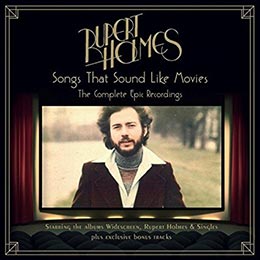
By Joe Marchese, The Second Disc
There are songs that sound like movies/There are themes that fill the screen/There are lines I say that sound as if they’re written/There are looks I wear the theatre should have seen…
With those words, Rupert Holmes welcomed listeners into his singular musical world – one in which the only limits were those of the singer-songwriter’s boundless imagination. In other words, there were no limits to Holmes’ finely crafted, elaborately realized pop dramas. His 1974 Epic Records debut, Widescreen, was filled with those songs that sound like movies, and now it’s about to be reissued as part of a box set appropriately entitled Songs That Sound Like Movies: The Complete Epic Recordings. This 3-CD collection, out today from Cherry Red Records, presents the first three albums created by the nonpareil musical storyteller and his collaborator and sonic wizard, producer-engineer Jeffrey Lesser, all of which pushed the boundaries of what was expected from pop music. The reissue of these long out-of-print treasures might be cause enough to celebrate, but to sweeten the deal, the label has added a number of rare and previously unreleased bonus tracks. If you only know Rupert Holmes from “Escape (The Pina Colada Song),” you’re in for a particular treat.
The Epic Records release of Widescreen attracted instant industry attention, quite simply because it didn’t resemble any other album, past or present. It presented songs with sound effects, dialogue and various-sized bands and orchestrations, creating what Holmes deemed film-rock. (Note that multi-instrumentalist Holmes played piano, electric piano, synthesizer, organ, saxophone, clarinet, and chimes on the LP!) No stranger to cinema, Barbra Streisand would record “Widescreen” and the album’s “Letters That Cross in the Mail,” among other Holmes compositions, on her 1975 LP, Lazy Afternoon, co-produced by Lesser and Holmes. “Letters” is one fine example of the songwriter’s wistful brand of drama, though perhaps the best is “Terminal.” This was the achingly sad story song that secured Holmes a three-LP contract with Epic, a yearning slice-of-life that honestly and devastatingly hit home for many listeners. Widescreen‘s eclectic nature may have kept it from scoring commercially; other tracks include the evocative big band tribute (with a haunting twist) “Second Saxophone” and the pop single “Talk.” Widescreen‘s showpiece is a 10-minute radio play, “Psycho Drama,” that closed out the original album, while “Phantom of the Opera” beat Andrew Lloyd Webber to the punch by over a decade and foreshadowed Holmes’ Tony Award-winning Broadway musical, The Mystery of Edwin Drood.
